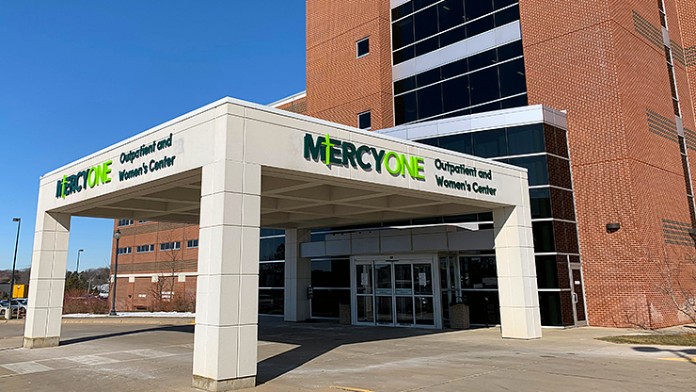Mercyone Waterloo Horizons

About Mercyone Waterloo Horizons
MercyOne Waterloo Horizons operates within MercyOne Waterloo Medical Center in Waterloo, Iowa. They are CARF accredited and Joint Commission certified. The facility offers comprehensive addiction treatment for adults and young adults struggling with substance use disorders including alcoholism, opioid addiction and co-occurring mental health conditions like depression or PTSD.
Horizons accepts Medicaid, Medicare, private insurance, TRICARE and self pay. Financial assistance is available through the Community Care program.
Levels of Accessible Treatment
The program offers medically managed detoxification with 24/7 physician and nursing care. Medication assisted treatment (MAT) is provided and uses FDA approved medications like buprenorphine, naltrexone and Suboxone. These medications are used to safely manage your withdrawal from alcohol, opioids, cocaine or benzodiazepines.
Their inpatient program includes individual and group therapy that focuses on cognitive behavioral therapy, dialectical behavior therapy and motivational interviewing.
Intensive outpatient programs (IOP) and partial hospitalization programs (PHP) allow you more flexibility to balance recovery with your daily responsibilities. You’ll attend nine to 15 hours of weekly therapy, relapse prevention and family counseling to rebuild relationships.
Mental Health and Addiction
Specialized services are offered and include dual-diagnosis treatment for mental health and addiction, gender specific care for men and women, as well as support for court referred individuals. Aftercare includes peer mentoring, naloxone education and discharge planning to ensure long term sobriety.
Clients praise the dedicated staff, though some note challenges with family communication.
| Levels of Care | Detox Service Setting | Programs | Payment Options |
|---|---|---|---|
|
Inpatient and residential programs provide round-the-clock medical and emotional support as you live at the treatment facility. This level of care may be recommended if you have severe addictions or mental health conditions since it removes outside distractions and allows you to focus solely on therapy. |
In outpatient therapy, you’ll attend therapy sessions several times each week while living at home. This is ideal if you have a strong support system and a lower risk of relapse. Outpatient treatment offers flexibility to maintain work, school or family obligations. |
||
|
Inpatient detox occurs in a dedicated treatment facility. You’ll live there around the clock and receive intensive medical support and supervision to help manage your withdrawal symptoms. It is suitable for individuals with moderate to severe addictions as it ensures a stable detox environment. |
Outpatient detox gives you access to medically supervised withdrawal services while still allowing you to live at home. You’ll attend a clinic for treatment and monitoring. This flexible option is suitable for those with mild to moderate withdrawal symptoms who have strong support systems. |
||
|
Alcohol detox programs offer medical support to help individuals withdraw safely from alcohol. Your care team may use medications to ease your symptoms and provide medical monitoring to address complications. |
Drug detox programs support individuals who are withdrawing from addictive substances like cocaine and heroin. Medical support helps you manage symptoms in a controlled and safe environment so you can achieve initial sobriety. |
||
|
Private Insurance
|
Self Pay
|
Levels of Care
Inpatient and residential programs provide round-the-clock medical and emotional support as you live at the treatment facility. This level of care may be recommended if you have severe addictions or mental health conditions since it removes outside distractions and allows you to focus solely on therapy.
In outpatient therapy, you’ll attend therapy sessions several times each week while living at home. This is ideal if you have a strong support system and a lower risk of relapse. Outpatient treatment offers flexibility to maintain work, school or family obligations.
Detox Service Setting
Inpatient detox occurs in a dedicated treatment facility. You’ll live there around the clock and receive intensive medical support and supervision to help manage your withdrawal symptoms. It is suitable for individuals with moderate to severe addictions as it ensures a stable detox environment.
Outpatient detox gives you access to medically supervised withdrawal services while still allowing you to live at home. You’ll attend a clinic for treatment and monitoring. This flexible option is suitable for those with mild to moderate withdrawal symptoms who have strong support systems.
Programs
Alcohol detox programs offer medical support to help individuals withdraw safely from alcohol. Your care team may use medications to ease your symptoms and provide medical monitoring to address complications.
Drug detox programs support individuals who are withdrawing from addictive substances like cocaine and heroin. Medical support helps you manage symptoms in a controlled and safe environment so you can achieve initial sobriety.
Contact

Jenise Alvarez received her Pre-Law degree in South Florida. She was born and raised in South Florida but now resides in metro Atlanta with her family. She is married with two children, a dog and a cat. She stays pretty busy running around after her little ones and making sure the animals stay out of trouble.

Courtney Myers writes and edits professionally from her home in North Carolina. She holds an MS in Technical Communication from N.C. State University and has worked in proposal management, marketing, and online content creation. She specializes in creating resources related to behavioral health and addiction recovery.




